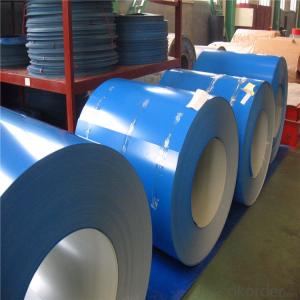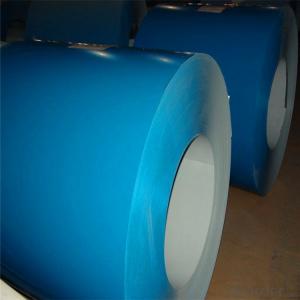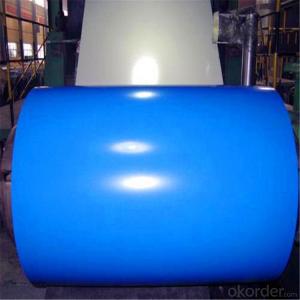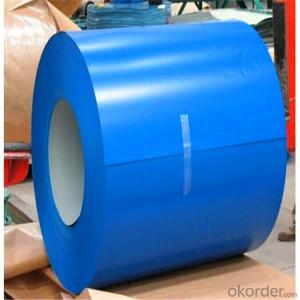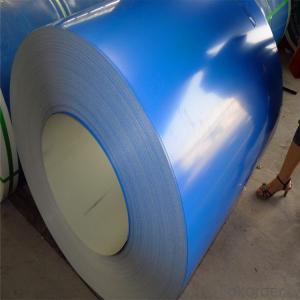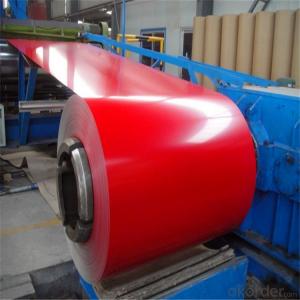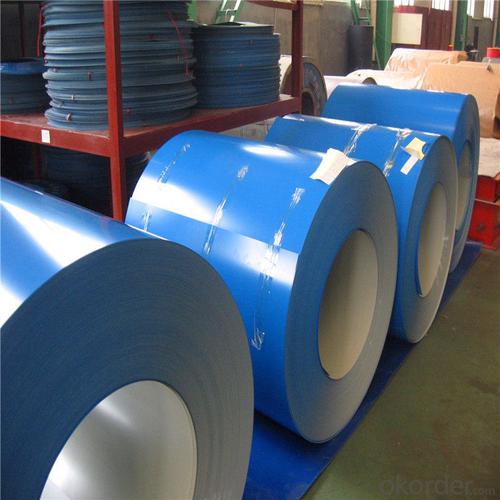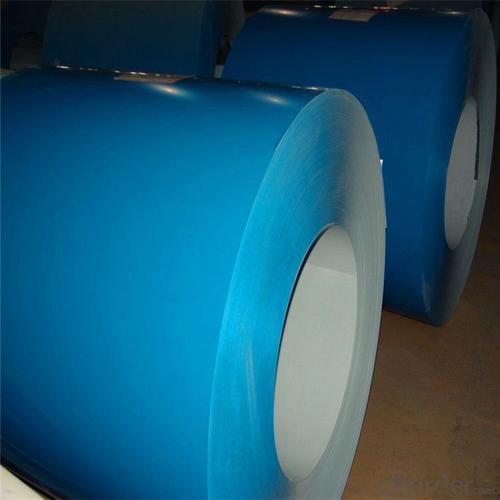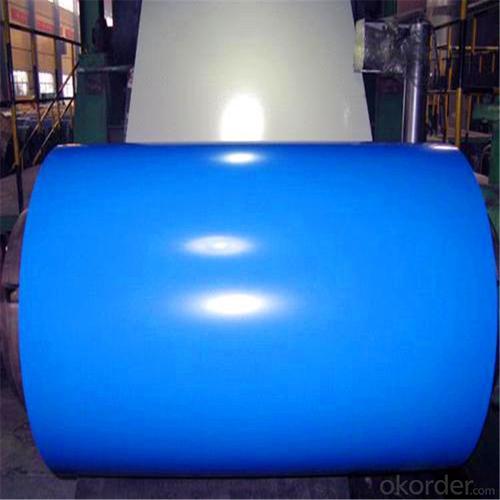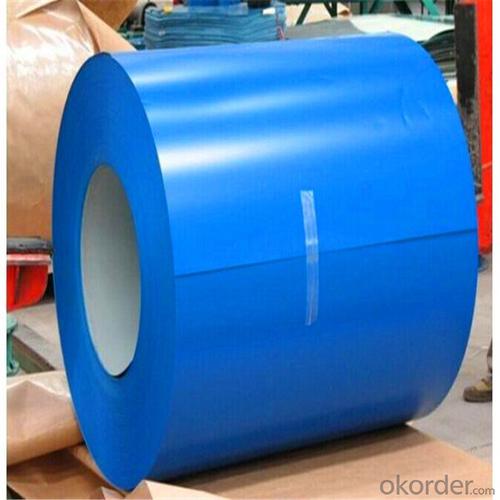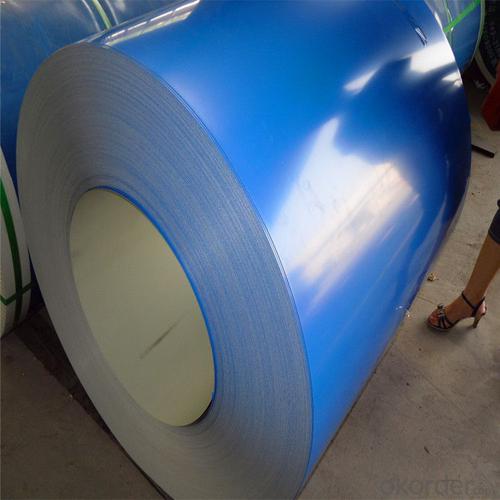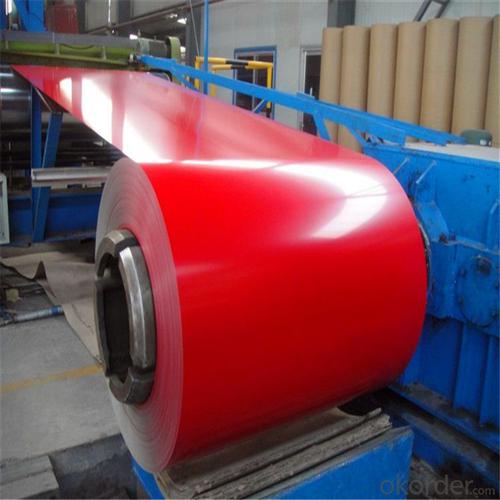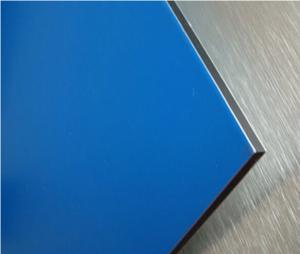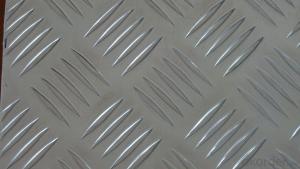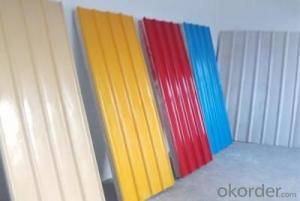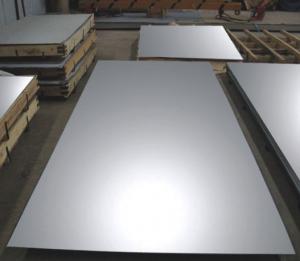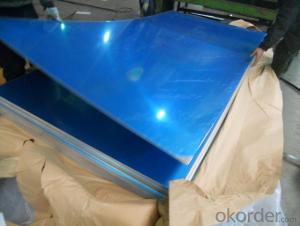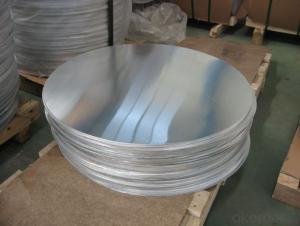0.4mm Thick PPGI Metal Sheet for Building
- Loading Port:
- Tianjin
- Payment Terms:
- TT or LC
- Min Order Qty:
- 25 m.t.
- Supply Capability:
- 5000 m.t./month
OKorder Service Pledge
OKorder Financial Service
You Might Also Like
Specification
0.4mm Thick PPGI Metal Sheet
Description of 0.4mm Thick PPGI Metal Sheet
Product | PPGI/PPGL |
Capacity | 5,000 tons/month |
Base material | Hot dipped galvanized steel |
Thickness | 0.2-2.0mm |
Width | 600-1250mm(according to your need) |
Coil Weight | 3-6tons |
Quality | SGCC, DX51D |
Color | RAL No. or customers samples’ color |
Zinc-coating | 30g/m2-180g/m2 |
Coil ID | 508mm/610mm |
Technique | Cold rolled—hot dipped galvanized—color coated |
Painting | Top painting:15~25μm |
Back painting: 6~10μm | |
Tolerance | Thickness: +/-0.02mm |
Width:+/-2mm | |
Shipment time | within 15-45 workdays |
Payment | T/T, L/C at sight |
Packing | Standard export packing |
The special order can be negotiated. | |
Application of 0.4mm Thick PPGI Metal Sheet
APPLICATION OF OUR PREPAINTED STEEL | ||||||||||
Construction | Outside | Workshop,agricultural warehouse,residential precast unit | ||||||||
corrugated roof,roller shutter door,rainwater drainage pipe,retailer booth | ||||||||||
Inside | Door,doorcase,light steel roof stucture,folding screen,elevator,stairway,ven gutter,Construction Wall | |||||||||
Electrical applicance | Refrigerator,washer,switch cabnet,instrument cabinet,air conditioning,micro-wave owen,bread maker | |||||||||
Fuiniture | Central heating slice,lampshade,chifforobe,desk,bed,locker,bookself | |||||||||
Carrying trade | Exterior decoration of auto and train,clapboard,container,isolation lairage,isolation board | |||||||||
Qthers | Writing panel,garbagecan,billboard,timekeeper,typewriter,instrument panel,weight sensor,photographic equipment | |||||||||
Products Show of 0.4mm Thick PPGI Metal Sheet

Product Advantages
1.With nearly 20 years experience in prepainted steel, accommodate different marketdemands. | ||||||||||||||
2.'Quality first, service first' is our business aim; 'The good faith get respect,cast quality market' is our Business philosophy . | ||||||||||||||
3.Having two series producttion line,with the abbual production capacity of 240000 tons. | ||||||||||||||
4.Exceed International ISO9001:2008&ISO14001:2004 quality and environmental standards | ||||||||||||||
5.Meet with ROHS standard |
Company Information
CNBM International Corporation is the most important trading platform of CNBM group.
Whith its advantages, CNBM International are mainly concentrate on Cement, Glass, Iron and Steel, Ceramics industries and devotes herself for supplying high qulity series of refractories as well as technical consultancies and logistics solutions.


F A Q
1, Your advantages?
professional products inquiry, products knowledge train (for agents), smooth goods delivery, excellent customer solution proposale
2, Test & Certificate?
SGS test is available, customer inspection before shipping is welcome, third party inspection is no problem
3, Factory or Trading Company?
CNBM is a trading company but we have so many protocol factories and CNBM works as a trading department of these factories. Also CNBM is the holding company of many factories.
4, Payment Terms?
30% TT as deposit and 70% before delivery.
Irrevocable L/C at sight.
5, Trading Terms?
EXW, FOB, CIF, FFR, CNF
6, After-sale Service?
CNBM provides the services and support you need for every step of our cooperation. We're the business partner you can trust.
For any problem, please kindly contact us at any your convenient time.
We'll reply you in our first priority within 24 hours.
- Q: How does special steel contribute to the medical aftermarket industry?
- Special steel plays a crucial role in the medical aftermarket industry by providing high-quality materials for the manufacturing of various medical devices and instruments. Its unique characteristics, such as corrosion resistance, high strength, and biocompatibility, enable the production of durable and long-lasting equipment like surgical instruments, implants, and prosthetics. The use of special steel ensures the safety and effectiveness of these medical products, ultimately contributing to improved patient outcomes and advancements in healthcare.
- Q: How is heat-resistant steel used in the production of furnaces and boilers?
- Heat-resistant steel is used in the production of furnaces and boilers due to its ability to withstand high temperatures without deforming or deteriorating. It is specifically designed to retain its strength and structural integrity even in extreme heat conditions. This steel is utilized for components such as heat exchangers, tubes, and liners, ensuring efficient heat transfer and preventing damage to the equipment. Ultimately, heat-resistant steel plays a crucial role in enhancing the durability and performance of furnaces and boilers.
- Q: How is heat-resistant steel used in high-temperature applications?
- Heat-resistant steel is used in high-temperature applications due to its ability to withstand extreme heat without losing its structural integrity. It is commonly used in industries such as aerospace, automotive, power generation, and petrochemical, where components are exposed to high temperatures. This steel is used to manufacture parts like turbine blades, exhaust systems, heat exchangers, and furnaces, ensuring reliable performance and preventing premature failure at elevated temperatures.
- Q: Can special steel be used in marine applications?
- Yes, special steel can be used in marine applications. Special steel, also known as marine grade steel, is specifically designed to withstand the harsh conditions of marine environments. It possesses qualities such as high corrosion resistance, increased strength, and durability, making it suitable for various marine applications. Special steel is commonly used in the construction of ships, offshore structures, and marine equipment. Its ability to resist corrosion from saltwater, chemicals, and other environmental factors makes it an ideal choice for marine applications. Furthermore, special steel is also used in the production of propellers, shafts, and other components that require high tensile strength and resistance to fatigue. Overall, special steel is a reliable and effective material for marine applications due to its unique properties and ability to withstand the challenges posed by the marine environment.
- Q: How does the alloying elements affect the properties of special steel?
- Alloying elements have a significant impact on the properties of special steel. By adding specific elements in varying proportions, the strength, hardness, corrosion resistance, and other properties of the steel can be altered. For example, chromium increases the steel's resistance to corrosion, manganese improves its strength, and nickel enhances its toughness. Different combinations of alloying elements can create specialized steels with specific properties tailored for various applications in industries such as automotive, aerospace, and construction.
- Q: How does special steel contribute to the defense and security industry?
- Enhanced strength, durability, and resistance to extreme conditions are crucial attributes of special steel, playing a vital role in the defense and security industry. This type of steel is specifically designed to meet the industry's unique demands, ensuring military equipment and infrastructure can withstand challenging environments and threats. One significant contribution of special steel to the defense and security sector lies in its use for manufacturing armored vehicles and tanks. These vehicles require high-strength steel to protect military personnel from ballistic and explosive threats. Special steel provides the necessary toughness and resilience to withstand impacts, ensuring soldiers' safety on the battlefield. Moreover, special steel is instrumental in the production of naval vessels and submarines. The maritime environment poses significant challenges due to its corrosive nature and harsh weather conditions. By utilizing special steel, naval ships can be constructed with superior corrosion resistance, extending their lifespan and reducing maintenance costs. Additionally, special steel is vital for the production of military-grade weaponry and ammunition. The steel's high strength and durability ensure that firearms, missiles, and other weapons can withstand extreme forces and function reliably in critical situations. This reliability is of utmost importance in the defense and security industry, where weapon failure could have severe consequences. Furthermore, special steel contributes to the construction of critical defense infrastructure, including military bases, bunkers, and communication towers. Its ability to withstand extreme temperatures, high pressures, and other challenging conditions ensures the reliability and longevity of these structures, enhancing national security. In summary, special steel's unique properties, including high strength, durability, and resistance to extreme conditions, are essential in the defense and security industry. By incorporating this material into military equipment, vehicles, weaponry, and infrastructure, defense organizations can ensure the safety, reliability, and effectiveness of their operations, ultimately contributing to national security.
- Q: What are the different quenching techniques used for special steel?
- There are several quenching techniques used for special steel, including oil quenching, water quenching, polymer quenching, and air quenching. Each technique has its own advantages and disadvantages and is chosen based on the specific requirements of the steel being quenched. Oil quenching provides a slower cooling rate, resulting in reduced risk of cracking and distortion. Water quenching, on the other hand, provides a rapid cooling rate, making it suitable for achieving maximum hardness. Polymer quenching offers a controlled cooling rate, allowing for the desired balance between hardness and toughness. Air quenching is the slowest cooling method, providing the least hardness but also the least risk of distortion. The choice of quenching technique depends on the desired properties of the special steel and the specific application it will be used for.
- Q: What are the challenges in recycling special steel?
- One of the main challenges in recycling special steel is the complexity of its composition. Special steel often contains various alloying elements and additives that can make the recycling process more difficult. These elements need to be carefully identified and separated in order to maintain the desired properties of the recycled steel. Additionally, special steel may have undergone specific heat treatments or surface coatings, which further complicate the recycling process. Proper sorting, identification, and treatment techniques are necessary to overcome these challenges and ensure the successful recycling of special steel.
- Q: How does special steel contribute to the dimensional stability of products?
- Special steel contributes to the dimensional stability of products through its unique properties and characteristics. One of the key factors is its high level of hardness, which allows it to resist deformation or changes in shape and size under varying temperature and load conditions. This hardness ensures that the product maintains its intended dimensions and shape, even when subjected to external forces or thermal fluctuations. Moreover, special steel often possesses excellent thermal conductivity, enabling it to efficiently distribute and dissipate heat. This property helps prevent localized heating or cooling, which can cause dimensional changes in materials. By maintaining consistent temperatures across the product, special steel minimizes the risk of warping, expansion, or contraction, thereby ensuring dimensional stability. Another aspect that contributes to dimensional stability is the low coefficient of thermal expansion of special steel. This coefficient measures the amount of expansion or contraction a material undergoes in response to temperature changes. Special steel's low coefficient means it experiences minimal dimensional changes when exposed to temperature variations. This characteristic is particularly crucial in applications where precise tolerances and tight dimensional control are required, such as in aerospace or automotive industries. Furthermore, special steel often possesses enhanced corrosion resistance, which helps prevent rusting or degradation of the material over time. Corrosion can lead to changes in the shape and dimensions of products, compromising their dimensional stability. By using special steel, manufacturers can ensure that their products maintain their original dimensions and structural integrity, even in harsh or corrosive environments. Overall, the unique properties of special steel, such as high hardness, excellent thermal conductivity, low coefficient of thermal expansion, and corrosion resistance, all contribute to the dimensional stability of products. By incorporating special steel into the manufacturing process, companies can produce high-quality products that maintain their precise dimensions and shape, ensuring reliability and longevity for end-users.
- Q: Can special steel be used for making aerospace components?
- Yes, special steel can be used for making aerospace components. Special steel alloys, such as stainless steel or titanium alloys, possess high strength, excellent corrosion resistance, and good heat resistance, making them suitable for aerospace applications where lightweight, durability, and resistance to extreme conditions are essential.
Send your message to us
0.4mm Thick PPGI Metal Sheet for Building
- Loading Port:
- Tianjin
- Payment Terms:
- TT or LC
- Min Order Qty:
- 25 m.t.
- Supply Capability:
- 5000 m.t./month
OKorder Service Pledge
OKorder Financial Service
Similar products
Hot products
Hot Searches
Related keywords
